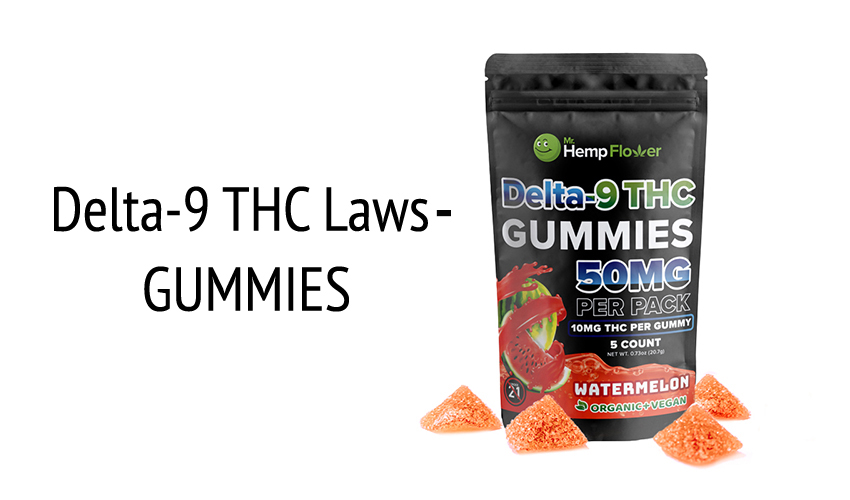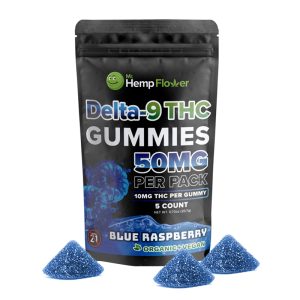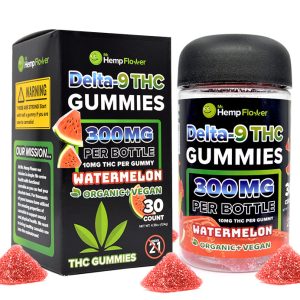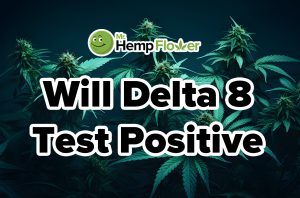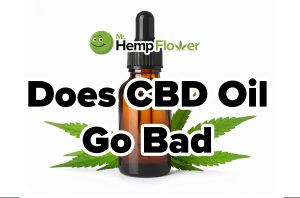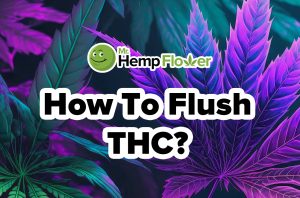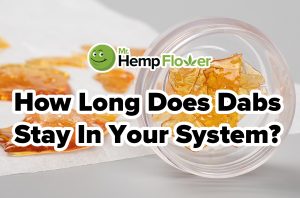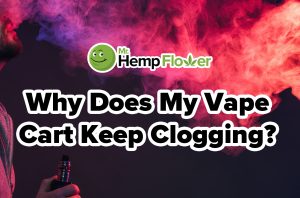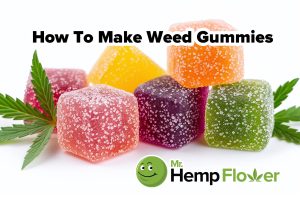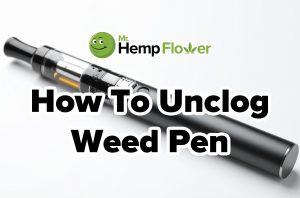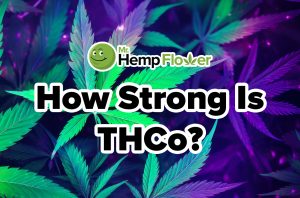Hemp-derived delta 9 gummies look like a regular hemp product. They are compliant with the Farm Bill and contain less than 0.3% THC. But, when you check the concentration of delta 9 in each gummy — which could be anywhere from 8 mg to 15 mg — you may wonder how they are legal in the US.
Although considered an “intoxicating” product, delta 9 gummies derived from hemp are as legal as any full spectrum CBD product. In fact, their legality depends on whether the state has actively banned THC-infused gummies or cannabinoid edibles in general.
In this article, we break down the legal status of hemp delta 9 gummies in each state, explain more about what they are, and where to buy quality products.
Summary
- Hemp-derived delta 9 THC is legal under the 2018 Farm Bill in a concentration of 0.3%.
- The legality of hemp delta 9 gummies with less than 0.3% THC depends on the state’s hemp laws. Mainly whether the state allows adding cannabinoids derived from hemp into food and food products.
- Some states are stringent and prohibit the sale of hemp delta 9 infused gummies, while others allow sale by registered retailers and possession and consumption by adults 21 and over.
- Friendly states: Delta 9 THC gummies derived from hemp are legal to sell, use and possess in most states, including California, Colorado, and Indiana.
- Gray states: In states like New Hampshire, hemp delta 9 gummies with less than 0.3% THC are in a legal gray area.
- Illegal states: States like Alabama, Georgia, Hawaii, Maryland, Michigan, and New York explicitly prohibit the sale, use and possession of hemp-derived delta 9 edibles, including gummies.
What is Hemp-Derived Delta-9 THC?
Delta-9 tetrahydrocannabinol (THC) is the main psychoactive ingredient in cannabis. If you’ve used marijuana before, you know this is the substance that causes the intoxication.
Delta-9 THC naturally occurs in both cannabis varieties — hemp and marijuana. In fact, this cannabinoid is the primary substance the law uses to differentiate between these two plants.
As you know, hemp — the federally legal, non-intoxicating Cannabis sativa — contains low concentrations of D-9 THC. Under federal law, hemp (and hemp products) is considered legal only if it has less than 0.3 percent THC on a dry weight basis.
Marijuana — the federally illegal, intoxicating variety — contains an average of 15% delta-9 THC. Naturally, the THC levels depend on the strain as some strains have higher levels of this compound — up to 25%.
This is one of the main reasons behind the legalization of hemp. It provides the health benefits of cannabis in a safe form that doesn’t get the user intoxicated. If you’ve ever consumed a CBD product with less than 0.3% D-9 THC, you know that the compound doesn’t get you high when present in low amounts.
Hemp is a versatile plant that’s broadly defined by federal law, so loopholes arise as people are trying to blend the line between hemp and marijuana.
Hemp-Derived Delta-9 THC vs. Marijuana-Derived Delta-9 THC
THC can be derived from both hemp and marijuana. The difference between the two? Chemically, there’s none. They are both delta-9 THC molecules that offer the same therapeutic potency but come from different sources.
From a legal standpoint, the source is everything. This compound is legal when derived from hemp with less than 0.3% D-9 THC on a dry weight basis. Unless the state has legalized marijuana, legal delta 9 THC is the one derived from hemp.
Where to Buy Legal Delta-9 Gummies?
The best place to purchase premium, lab-tested delta 9 gummies is from specialized online retailers like Mr. Hemp Flower.
Our hemp-derived delta-9 THC gummies are full spectrum gummies packed with 10mg of premium hemp extract. We believe in the true power of full spectrum cannabis, so we formulated this product to reflect the best combination of cannabinoids and terpenes for whole-plant therapy.
This organic and vegan formula comes in two delicious flavors — watermelon and blue raspberry. Prepare to enjoy deliciousness that will wake up your taste buds and your mind.
As any hemp product rich in D-9 THC, these gummies will get you intoxicated . They are designed to provide relief and recreation, so if this is your first time trying them, make sure you start with half a gummy.
Mr. Hemp Flower is mindful of the dose of each product when creating it. When it comes to our D-9 gummies, we consider 10mg the golden standard for anyone that needs relief, but is trying to avoid the “couch lock” and stay more active. If you want to keep daytime drowsiness at bay, avoid taking large amounts of D-9 THC.
These premium gummies come with a certified third-party lab test to confirm potency and purity. To make them, we use locally grown, pure, non-GMO, quality hemp compliant with federal laws. We extract our hemp D-9 THC directly from the plant, so you can rest assured it’s natural. Once we have a clean and tested distillate, we formulate our products in a way that each is under the legal 0.3% total THC by dry weight basis.
If you check the labs for the product, you will notice we calculate the total THC amount, aka Delta-9 THC + THCA, as required by federal law. Finally, our products contain less than 0.3% Delta-9 THC and are made from hemp with less than 0.3% delta-9 THC. Meaning they are as legal as any product within the full spectrum CBD category.
Yes… They Are Intoxicating.
It all depends on your body’s tolerance, but these gummies will get you intoxicated.
Regarding their legality as an intoxicating product, they are 100% legal under the 2018 Farm Bill. As mentioned, hemp and hemp extracts or “THC in hemp” are not controlled substances.
The Farm Bill excluded hemp from the list of controlled substances and broadly defines hemp (and its cannabinoids) as a plant with less than 0.3% THC.
Therefore, if a hemp-derived product doesn’t exceed the 0.3% delta-9 THC limit, it meets the legal definition of hemp and is therefore legal under federal law.
The only thing these gummies “go against” is the intention of the federal government to legalize hemp as a non-intoxicating plant. Otherwise, any product within this category is perfectly legal.
How Are Hemp Delta-9 Gummies Legal?
Thanks to the Farm Bill, naturally derived hemp compounds are legal as long as they are extracted from legally compliant hemp that contains less than 0.3% THC by dry weight.
This same rule applies to the final product. Meaning, the final hemp-derived D-9 THC product must contain less than 0.3 percent D-9 THC by dry weight to be considered legal.
We’ve found a way to “squeeze” enough delta-9 THC into a product that fulfills the legality requirements and still contains high levels of delta-9 THC.
Here’s how.
We used a larger gummy and a full spectrum hemp distillate extracted directly from the plant. Each gummy contains 10mg of delta-9 THC on a dry weight basis — which may seem like a lot. But, if we do the math, it’s not.
In fact, a gummy weighs around 4.3 grams with moisture content or 4.1 grams on dry weight without moisture content.
Moisture content is a major player in dry weight potency testing. When a sample is tested for total THC concentration, it’s calculated on a dry weight basis. To get an accurate result, labs “correct” the moisture content by using several methods of drying, including oven-drying.
Moisture plays a significant role in the concentration of THC. If a product sample contains more moisture than a drier sample, the drier one will show a higher percent of THC by weight — even though both samples contain the same amount.
It’s the same as if you put equal drops of THC in a tequila glass and a 50-gallon water fish tank (without actual fish). Both contain the same amount of THC, but the substance in the fish tank is more diluted.
So, each 4.3 gram gummy weighs 4.1 grams on dry weight without moisture content (legally, dry weight is what matters).
The THC cap for each 4.1g gummy is around 12 milligrams of delta-9 THC — and the product is still under the legal THC limit.
To get the maximum levels of THC a gummy can contain, we convert the grams into milligrams. In this case, 4.1 grams multiplied by 1,000 equals 4,100 milligrams. Then, we multiply 4,100 milligrams by 0.3% (.3% = 3mg/g), which equals 12.3 milligrams.
Meaning, in a 4g gummy, we can pack 12.5 mg of delta-9 THC (ours are 10mg) and still have the gummy under the legal THC limit. Our gummies are truly full spectrum because they contain a higher concentration of D-9 THC, which is essential for a product to be considered full spectrum.
Legality of Hemp Delta 9 Gummies in Every US State
Based on the legality of hemp delta 9 gummies, states can be divided into three categories:
- Friendly states – full spectrum hemp products with less than 0.3% THC, including gummies, are entirely legal.
- Gray states – full spectrum hemp products, particularly edibles, are permitted with some restrictions.
- Illegal states – full spectrum hemp products are illegal, particularly hemp edible products. Or, the states only allow the sale of THC-free hemp products.
Let’s look at the legal status of hemp delta 9 gummies in each state.
| State | Legal Status | Relevant Bill |
|---|---|---|
| Alabama | Friendly | SB 225 |
| Alaska | Legal | SB 6, SB 27 |
| Arizona | Likely illegal | SB 1098 |
| Arkansas | Friendly | HB 1640 |
| California | Legal | AB-45 |
| Colorado | Legal | SB 117, HB 1295 |
| Connecticut | Legal | SB 893 |
| Delaware | Legal | SB 266 |
| Florida | Legal | SB 1020 |
| Georgia | Prohibited | HB 215 |
| Hawaii | Illegal | HB 2689 |
| Idaho | Illegal | HB 126 |
| Illinois | Legal | SB 2298 |
| Indiana | Legal | SB 516 |
| Iowa | Legal | Iowa Code |
| Kansas | Illegal | HB 2167 |
| Kentucky | Legal | HB 333 |
| Louisiana | Legal | Act 498 (2022) |
| Maine | Legal | LD 630 |
| Maryland | Legal | HB 837 |
| Massachusetts | Legal | Massachusetts Department of Health |
| Michigan | Legal | Bureau of Marijuana Regulation (BMR) |
| Minnesota | Legal | SF 2746 |
| Mississippi | Legal | SB 2610 |
| Missouri | Legal | SB 491 |
| Montana | Legal | Montana Code Annotated, Title 80, Chapter 18 |
| Nebraska | Likely Illegal | Nebraska Hemp Farming Act (2019) |
| Nevada | Likely Illegal | SB 537 |
| New Hampshire | Gray Area | HB 459 (2019) |
| New Jersey | Likely Legal | New Jersey Hemp Farming Act (2019) |
| New Mexico | Legal | Hemp Manufacturing Act (HB 581, 2019) |
| New York | Illegal | Marihuana Regulation and Taxation Act (Cannabinoid Hemp Regulations) |
| North Carolina | Legal | SB 445 |
| North Dakota | Not Explicitly Banned | HB 1349 |
| Ohio | Legal | SB 57 |
| Oklahoma | Legal | SB 868 |
| Oregon | Legal | HB 3000 |
| Pennsylvania | Illegal | HB 967 |
| Rhode Island | Legal for Adults 21+ | Industrial Hemp Growth Act |
| South Carolina | Legal | South Carolina Hemp Farming Act |
| South Dakota | Legal | HB 1008 |
| Tennessee | Legal for Adults 21+ | SB 378 (2023) |
| Texas | Legal | HB 1325 |
| Utah | Legal | HB 277 |
| Vermont | Legal for Adults 21+ | Vermont Statutes |
| Virginia | Legal | HB 2294 (2023) |
| Washington | Legal | SB 5367 |
| West Virginia | Legal for Adults 21+ | SB 220 |
| Wisconsin | Legal | Wisconsin Statutes |
| Wyoming | Permitted | HB 108 (2023) |
1. Alabama
Hemp-derived delta 9 THC is legal in Alabama under SB 225. But hemp delta 9 gummies are not.
Alabama legalized hemp and removed the crop from the list of controlled substances with SB 225, passed in 2019. Among other things, the bill allows the distribution and sale of CBD dietary supplements in pharmacies.
The state’s hemp product regulations are vague, but state officials have warned against selling cannabidiol in food. The FDA doesn’t allow the sale of cannabidiol in food items and considers gummies food. Alabama holds close to federal law and doesn’t allow the sale of this cannabinoid in food products.
2. Alaska
Hemp-derived delta 9 THC is legal in Alaska in a concentration of no more than 0.3%.
The legality of gummies derived from hemp is murky in Alaska. The Last Frontier allows the distribution, sale, and possession of hemp products with no more than 0.3% delta 9 to adults 18 and over.
However, Alaska still operates under its pilot program, so these products remain unregulated. Alaska legalized hemp under SB 6 and passed SB 27 in 2016, which aligned the state with federal law. The compliance of Alaska’s hemp laws with federal regulations makes adding CBD in food murky.
3. Arizona
Hemp delta 9 gummies with less than 0.3% THC are likely illegal in Arizona.
The state legalized hemp under SB 1098, passed in 2019. This bill defines hemp products broadly and contains vague language around the legality of CBD. But, it also excludes “any product meant to be ingested” from the definition of ‘hemp product’. This means that delta 9 gummies are likely illegal in this state.
4. Arkansas
Hemp-derived delta 9 THC is legal in Arkansas, and so are hemp delta 9 gummies with a THC concentration of no more than 0.3%.
Arkansas legalized hemp under HB 1640, allowing the sale of “publicly marketable products,” including food. This makes delta 9 gummies derived from hemp legal in this state.
5. California
Hemp-derived delta 9 is legal in California, and so are hemp delta 9 gummies with less than 0.3% THC.
The state gave the green light and regulated CBD products under AB-45 (enacted in 2021). This bill allows the sale, use and possession of shelf-stable food, like gummies, candy, and baked goods, infused with hemp extract containing 0.3% THC.
However, hemp food items in California must be made in compliance with the state’s food manufacturing requirements and by licensed processors.
6. Colorado
Hemp-derived delta 9 THC is legal in Colorado, and so are hemp delta 9 gummies with less than 0.3% THC.
The state legalized hemp under SB 117 and regulated hemp products like food ingredients under HB 1295. Under Colorado’s law, an “industrial hemp product” is a finished product intended for human use or consumption and is a food or food additive.
7. Connecticut
Hemp-derived delta 9 is legal in Connecticut, and so are hemp delta 9 gummies with no more than 0.3% THC.
The state legalized hemp under SB 893 in 2019, which also removed hemp from the definition of marijuana. Connecticut’s hemp laws allow the sale, use and possession of hemp-derived CBD food products, including gummies with less than 0.3% THC.
8. Delaware
Hemp-derived delta 9 THC is legal in Delaware, and so are delta 9 gummies with less than 0.3% THC.
The state legalized hemp under SB 266, but has yet to regulate the sale, use and possession of hemp products. Despite outdated laws, you can lawfully purchase delta 9 gummies derived from hemp that contain less than 0.3% THC by weight in Delaware.
9. Florida
Hemp-derived delta 9 THC is legal in Florida, and so are hemp delta 9 gummies with less than 0.3% THC.
The state legalized hemp under SB 1020, passed in June 2019. This bill permits the sale, use and possession of hemp edible products, including gummies with less than 0.3% THC by weight. Florida allows the sale of hemp extract in food by a Hemp Food Establishment that has a food license.
10. Georgia
Hemp-derived delta 9 is legal in Georgia, but hemp delta 9 gummies are prohibited.
Georgia’s law permits the sale, use and possession of hemp products with less than 0.3% THC, except for food items. It’s illegal to manufacture, sell, possess, and use food infused with THC in this state. Georgia legalized hemp and hemp-derived cannabinoids in May 2019 under HB 215.
11. Hawaii
Hemp-derived delta 9 is legal in Hawaii, but hemp delta 9 gummies with less than 0.3% THC are illegal.
The Interim Rules released by the Hawaiian Department of Agriculture in 2021 prohibit the sale of hemp-derived cannabinoids in the form of a gummy. The only permitted forms of oral consumption are tablets, capsules, softgel, gelscap, powder, or liquids.
The state legalized hemp under HB 2689, removing hemp from the definition of marijuana and the list of controlled substances. This means that delta 9 THC derived from hemp is legal in this state in a concentration of no more than 0.3% and in products that are not restricted by state law.
12. Idaho
Hemp delta 9 gummies with less than 0.3% THC are illegal in Idaho.
The state’s hemp law (HB 126) only permits the manufacture, distribution, and sale of hemp-derived products with zero THC, including hemp delta 9 THC.
13. Illinois
Hemp-derived delta 9 THC is legal in Illinois and so are hemp delta 9 gummies with less than 0.3% THC.
State law (SB 2298) permits the distribution, sale, use and possession of hemp-derived products with less than 0.3% THC. Hemp is a legal crop in this state, and so are most hemp-derived products, including edibles. You can purchase hemp delta 9 gummies in this state with no restrictions.
14. Indiana
Hemp-derived delta 9 and delta 9 gummies with less than 0.3% THC are legal in Indiana.
The state legalized hemp in May 2019 under SB 516, allowing the sale of hemp-derived products of almost all types. Smokable hemp products are prohibited in Indiana, but the law permits the sale of edibles with less than 0.3% THC.
15. Iowa
Hemp-derived delta 9 is legal in Iowa and so are hemp delta 9 gummies with less than 0.3% THC.
Iowa permits and regulates the manufacture, distribution, sale, use and possession of “consumable hemp products.”
Defined as “a liquid or solid hemp product intended to be introduced into the human body by ingestion or internal absorption,” consumable hemp products include food, chew, oils and lotions, gummies, etc.
As long as the product contains less than 0.3% THC, is not intended for inhalation, doesn’t contain alcohol, and is not infused into meat or poultry, it’s legal in Iowa.
16. Kansas
Hemp-derived delta 9 THC gummies are illegal in Kansas because they contain THC.
Kansas only permits the manufacture, distribution, sale, use and possession of hemp-derived products with no THC concentration. Delta 9 is allowed only in CBD flower in a concentration of no more than 0.3%. Kansas legalized hemp under HB 2167 in 2018, permitting the cultivation of this crop by licensed individuals.
17. Kentucky
Hemp-derived delta 9 is legal in Kentucky, and so are delta 9 gummies with less than 0.3% THC.
Under HB 333, Kentucky legalized hemp and hemp-derived products containing cannabidiol with less than 0.3% THC. Smokable hemp products are illegal in Kentucky, but there are no restrictions against edible products such as gummies.
18. Louisiana
Hemp-derived delta 9 is legal in Louisiana, and so are hemp delta 9 gummies with less than 0.3% THC.
Under Act 498 (2022), hemp-derived food and beverages fall under the group of ‘consumable hemp products,’ which are legal and regulated in this state. Edible products like gummies must not contain more than 8 mg of THC per serving and no more than 0.3% total THC.
19. Maine
Hemp-derived delta 9 THC and hemp delta 9 gummies with less than 0.3% THC are legal in Maine.
Maine permits the sale, use and possession of hemp food products, including gummies with no more than 0.3% THC.
Hemp-infused food and food products must not be sold under therapeutic claims. The state legalized hemp under LD 630 in February 2019 and removed delta 9 THC derived from hemp from the list of controlled substances.
20. Maryland
Hemp-derived delta 9 gummies with less than 0.3% THC are illegal in Maryland.
The state doesn’t allow the manufacture, sale, use and possession of food infused with cannabinoids. Maryland Health General §21-256 considers adding CBD or THC to food and beverages adulterated. Maryland legalized hemp and hemp products for commercial purposes under HB 1123 in 2019.
21. Massachusetts
Hemp-derived delta 9 gummies with less than 0.3% THC are illegal in Massachusetts.
The state aligned its hemp laws with federal laws and doesn’t allow the manufacture, sale, and use of cannabinoids like CBD in food products. In Massachusetts, you can order non-food hemp cannabinoid products, but not gummies.
22. Michigan
Hemp-derived delta 9 gummies with less than 0.3% THC are illegal in Michigan.
The state doesn’t permit the manufacture, sale, use and possession of hemp cannabinoids in food and beverages. Michigan holds close to federal law, so adding CBD in food or marketing CBD oil as a dietary supplement is illegal.
23. Minnesota
Hemp-derived delta 9 gummies with less than 0.3% THC are legal in Minnesota.
Under Minnesota’s Statutes, an “edible cannabinoid product” is a legal product that can be eaten or consumed as a beverage. It also contains a cannabinoid in combination with food and is not a drug.
Cannabinoid-infused products are fully legal and regulated in Minnesota, so you can lawfully purchase hemp delta 9 gummies in this state.
24. Mississippi
Hemp-derived delta 9 gummies with less than 0.3% THC are legal in Mississippi.
The state legalized hemp under SB 2725 and has no restrictions on the manufacture, distribution, sale, use and possession of hemp-derived products with less than 0.3% THC, including gummies.
25. Missouri
Hemp-derived delta 9 gummies with less than 0.3% THC are legal in Missouri.
The state legalized hemp under HB 2034 but has yet to regulate the sale, use and possession of hemp-derived products. You can lawfully purchase hemp delta 9 gummies with less than 0.3% THC in this state without restrictions.
26. Montana
Hemp-derived delta 9 gummies are legal in Montana under certain requirements.
Montana allows the sale, use and possession of delta 9 gummies only under certain conditions. The state permits the distribution and sale of pre-packaged CBD products manufactured outside Montana.
Otherwise, the state has accepted the FDA’s stance regarding adding CBD to food and doesn’t allow it.
27. Nebraska
Hemp-derived delta 9 gummies with less than 0.3% THC are likely illegal in Nebraska.
Nebraska has no official law that regulates hemp-derived products. The state legalized hemp and hemp CBD products with less than 0.3% THC under the Nebraska Hemp Farming Act in 2019. This bill aligned state with federal law and doesn’t permit the sale of cannabinoids in food, which makes delta 9 gummies illegal.
28. Nevada
Hemp-derived delta 9 gummies with less than 0.3% THC are likely illegal in Nevada.
The state allows the manufacture, distribution, and sale of hemp products with less than 0.3% THC but considers cannabinoid-infused food products adulterated. This is because Nevada holds close to federal law, which hasn’t approved CBD as an additive in a food product.
29. New Hampshire
Hemp-derived delta 9 gummies with less than 0.3% THC are in a gray area in New Hampshire.
The state hasn’t regulated the manufacture, distribution, sale, use and possession of hemp-derived products. According to the New Hampshire Liquor Commission, the use of hemp-derived CBD in food or beverages is prohibited.
New Hampshire legalized hemp under HB 459 in 2019, removing it from the definition of marijuana. The bill also allowed the sale of hemp-derived products with less than 0.3% THC, which makes delta 9 derived from hemp within these limits legal.
30. New Jersey
Hemp-derived delta 9 gummies with less than 0.3% THC are likely legal in New Jersey.
The state’s hemp laws are vague but permit the sale, use and possession of hemp-derived products with no more than 0.3% THC to the extent of federal law. There are no clear regulations on cannabinoid-infused gummies derived from hemp, so you can lawfully order delta 9 gummies online as they are not explicitly banned.
The state passed the New Jersey Hemp Farming Act in 2019, removing hemp and hemp-derived delta 9 THC from the list of controlled substances.
31. New Mexico
Hemp-derived delta 9 gummies with less than 0.3% THC are legal in New Mexico.
The state permits and regulates the sale of hemp-derived products of all types as long as they contain less than 0.3% THC. New Mexico’s law is aligned with federal law but doesn’t explicitly ban the sale, use and possession of edibles. Instead, it regulates them.
This means you can buy hemp delta 9 gummies as long as they are made and sold in line with the New Mexico Food Act and Food Service and Sanitation Act.
New Mexico legalized hemp under the Hemp Manufacturing Act (HB 581), passed in 2019. It removed hemp from the definition of marijuana and hemp THCs (including delta 9) from the list of Controlled Substances.
32. New York
Hemp-derived delta 9 gummies with less than 0.3% THC are illegal in New York.
The state has banned the manufacture, sale, use and possession of delta 9 gummies and edible cannabinoid products under the Marihuana Regulation and Taxation Act (Cannabinoid Hemp Regulations). New York holds close to the FDA’s requirements and doesn’t allow the sale of hemp cannabinoids to food or any consumable hemp product.
33. North Carolina
Hemp-derived delta 9 gummies with less than 0.3% THC are legal in North Carolina.
You can lawfully purchase delta 9 gummies in this state as long as their THC concentration doesn’t exceed 0.3% by weight. The state legalized hemp and hemp-derived delta 9 under SB 445 and didn’t explicitly prohibit the sale, use and possession of these gummies.
34. North Dakota
Hemp-derived delta 9 gummies with less than 0.3% THC are not explicitly banned in North Dakota.
The state removed hemp and hemp delta 9 from the list of controlled substances under HB 1349. This bill also allowed the sale of hemp-derived products with less than 0.3% THC, including gummies.
35. Ohio
Hemp-derived delta 9 gummies with less than 0.3% THC are legal in Ohio.
The state legalized hemp under SB 57 and permits the manufacture, distribution, possession and sale of hemp-derived products with less than 0.3% THC. The bill defines a “hemp product” as hemp buds, flowers, cosmetics, dietary supplements, and food intended for animal or human consumption, making these gummies fully legal.
36. Oklahoma
Hemp-derived delta 9 gummies with less than 0.3% THC are legal in Oklahoma.
The state legalized hemp under SB 868, allowing the manufacture, distribution, sale, use and possession of hemp-derived products with less than 0.3% THC.
Under state law, dispensaries and retail stores selling hemp-derived products must be licensed as food establishments. Because there’s no explicit ban on these products, you can lawfully order delta 9 gummies online.
37. Oregon
Hemp-derived delta 9 gummies with less than 0.3% THC are legal in Oregon.
You can lawfully purchase hemp-derived delta 9 gummies in Oregon with no restrictions. The state permits the sale, use and possession of hemp gummies with less than 0.3% THC. Under HB 3000, hemp gummies with a high THC concentration are legal for people 21 and older. This means you can buy both “intoxicating” hemp products and non-intoxicating hemp products in this state.
38. Pennsylvania
Hemp-derived delta 9 gummies with less than 0.3% THC are illegal in Pennsylvania.
The state prohibits the sale, use and possession of consumable CBD products, including gummies and edibles. Pennsylvania legalized hemp under HB 967 and aligned its laws with federal regulations.
39. Rhode Island
Hemp-derived delta 9 gummies are legal in Rhode Island for adults 21 and over.
The state authorized the manufacture, distribution, and sale of hemp-derived consumable products with less than 0.3% THC under the Industrial Hemp Growth Act. You can buy hemp delta 9 gummies in this state if you’re 21 and over.
40. South Carolina
Hemp-derived delta 9 gummies with less than 0.3% THC are legal in South Carolina.
You can lawfully purchase hemp delta 9 gummies with less than 0.3% THC in South Carolina. The state allows the manufacture, distribution, and sale of hemp-derived delta 9 products under the South Carolina Hemp Farming Act.
South Carolina leans towards federal law when it comes to adding cannabinoids to food, with a few exceptions. It prohibits adding pure CBD isolate in food items but permits adding full spectrum extract that doesn’t bear health claims or declaration of CBD.
41. South Dakota
Hemp-derived delta 9 gummies with less than 0.3% THC are legal in South Dakota.
Cannabinoid-infused foods, like delta 9 gummies, are not explicitly prohibited or regulated in this state. The state legalized hemp under HB 1008 and allowed the commercial sale and use of this crop and hemp-derived products with less than 0.3% THC.
42. Tennessee
Hemp-derived delta 9 gummies are legal in Tennessee for adults 21 and over.
State law doesn’t explicitly prohibit the sale, use and possession of hemp-derived edibles like gummies. Tennessee regulated hemp products under SB 378 in 2023, allowing the commerce of hemp-derived products with less than 0.3% THC.
43. Texas
Hemp-derived delta 9 gummies with less than 0.3% THC are legal in Texas.
You can purchase delta 9 gummies derived from hemp in this state without restrictions. Texas legalized hemp under HB 1325, permitting the sale, use and possession of “consumable hemp products” with less than 0.3% THC.
44. Utah
Hemp-derived delta 9 gummies with less than 0.3% THC are legal in Utah.
The state holds close to federal law when it comes to adding cannabinoids to food products and prohibits it with a few exceptions. Utah lists hemp-derived gummies with less than 0.3% THC on its Registered Product List, which means they are allowed for sale in this state.
45. Vermont
Hemp-derived delta 9 gummies with less than 0.3% THC are legal in Vermont.
But, they can only be sold to adults 21 and over in adult-use and medical marijuana stores. The Cannabis Control Board regulates the sale of consumable hemp products and “intoxicating hemp products” that contain 1mg or greater THC per serving and 10 mg total THC per package.
46. Virginia
Hemp-derived delta 9 gummies with less than 0.3% THC are legal in Virginia under certain requirements.
Virginia legalized and regulated the manufacture, distribution, sale, use and possession of hemp products under HB 2294, enacted in 2023. The state permits the sale of finished hemp products with less than 0.3% THC that contain no more than two milligrams of total THC per package.
47. Washington
Hemp-derived delta 9 gummies with less than 0.3% THC are legal in Washington. But, they can be sold only in licensed dispensaries.
Under Washington law, hemp products containing “detectable levels” of THC are considered cannabis. Therefore, they are regulated by the state Liquor and Cannabis Board and can be sold only in licensed stores in the state. This means that although legal, you can’t purchase delta 9 gummies unless they come from a state-licensed dispensary.
48. West Virginia
Hemp-derived delta 9 gummies with less than 0.3% THC are legal in West Virginia for adults 21 and over.
West Virginia allows the sale, use and possession of cannabinoid-infused food. Under state law, products intended for digestion that are infused with CBD and contain less than 0.3% THC are considered food and are not adulterated.
The state amended its hemp laws under SB 220, which allowed the sale of hemp cannabinoid products by licensed retailers and to adults 21 and older.
49. Wisconsin
Hemp-derived delta 9 gummies with less than 0.3% THC are legal in Wisconsin.
The state doesn’t explicitly prohibit adding hemp-derived cannabinoids to food products, but it also doesn’t regulate it. You can lawfully purchase delta 9 gummies in Wisconsin with no restrictions. Under Wisconsin’s Statutes, hemp and hemp-derived delta 9 THC are completely legal in this state.
50. Wyoming
Hemp-derived delta 9 gummies with less than 0.3% THC are permitted in Wyoming.
The state holds close to federal regulations when it comes to the manufacture and sale of hemp-derived food products infused with cannabinoids.
However, there are no official laws that explicitly prohibit the sale, use and possession of hemp delta 9 gummies with less than 0.3% THC. Under HB 108 (passed in 2023), the state restricted edible THC products to people 18 and older.
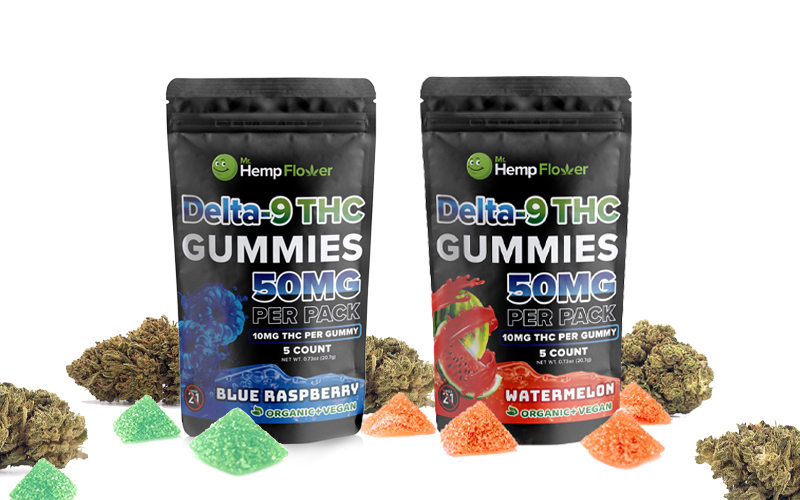
What Are the Benefits of Hemp Delta 9 Gummies?
Delta-9 THC gummies are the “truest” full spectrum gummies you can find — and here’s why.
Full spectrum CBD or THC products are made from the entire hemp plant and include various cannabinoids beyond the main CBD and THC.
For example, our THC Gummies contain 10mg Delta-9, cannabidiol (CBD), as well as other cannabinoids like cannabigerol (CBG), cannabinol (CBN), etc.
Compared to one cannabinoid product and broad spectrum CBD products (no THC), full spectrum are not only rich in every cannabinoid possible — but they also contain plenty of it.
Full spectrum products are loaded with terpenes and flavonoids. Terpenes and flavonoids are minor but important (and mighty) molecules in hemp. They give the products its flavor and aroma and offer a range of benefits, including antioxidant, anti-inflammatory, and neuroprotective properties.
Full Spectrum THC vs. Full Spectrum CBD: What’s the Difference?
Until now, full spectrum CBD products have been in the spotlight. They are still immensely beneficial because they contain the entire hemp plant profile. Whether the product you buy is full spectrum THC or CBD depends on which compound prevails.
Unlike full spectrum delta-9 THC, full spectrum CBD products don’t have high levels of THC.
Believe it or not, that gives them a disadvantage.
Research shows that consuming a hemp product with the tiniest amount of THC can be far more beneficial than without it.
According to a 2019 study conducted by researchers at the University of New Mexico, THC showed the “strongest correlation with therapeutic relief” than cannabidiol (CBD).
The scientific community has long known about the potent benefits of THC.
CBD and THC have been studied in different situations and, many times, people react better when the product has higher levels of THC in it.
There’s also the science behind the entourage effect. This theory points out the importance of the interactions between cannabinoids and between terpenes and cannabinoids.
Research shows that cannabidiol (CBD) has the biggest influence on THC expression. A 2010 clinical trial on pain for patients with multiple sclerosis (MS) revealed that a balanced mixture of CBD and THC (full spectrum) offered significant pain-killing effects.
Researchers believe that CBD can lower or intensify the effects of THC by influencing its binding activity with cannabinoid receptors in the brain.
Side Effects of THC Use
Like any psychotropic compound, THC exhibits some temporary side-effects, including:
- Increased heart rate
- Dry mouth
- Coordination problems
- Red eyes
- Slower reaction times
- Anxiety
- Memory loss
As mentioned, when combined with CBD, the side effects of THC are less expressed. Proper dosing is vital when it comes to ingesting this compound. If you’ve ever used THC edibles, you know they hit differently than smokables. When you smoke or vape THC, this psychotropic compound is quickly absorbed through the lungs and into the bloodstream.
When you ingest it, the body breaks down this compound into its metabolite 11-hydroxy-THC, which is believed to be more potent than D-9 THC and acts on your cannabinoid receptors.
As a result, you experience a longer, more powerful intoxication with edibles. If this is your first time consuming THC, start with half a gummy, wait about 30 minutes to an hour (or two) to feel any effects, and continue from there. The intoxication you get from edibles can last up to 12 hours.
Delta-9 THC FAQ
Is Delta-9 legal in all 50 states?
In hemp products, Delta-9 is legal if it is present in less than 0.3% on dry weight.
Will delta 10 get you high?
If consumed at the same dose, Delta-9 is stronger. Delta-8 is half as potent as D-9 and is more sedative and mellow.
Will Delta-9 get you high?
Yes, it will. Delta-9 THC is the main intoxicating compound in cannabis that activates the CB1 receptor in the brain, which causes the “high” feeling.
Does hemp have Delta-9?
Hemp does have D-9 THC. Legally, hemp can contain 0.3% or less THC on a dry weight basis.
Read our legal disclaimer HERE. While we try to stay as up to date as possible on all state laws, you should do your own due diligence and work with a legal professional to ensure you are operating legally in your state or territory at all times.

